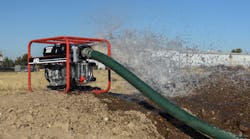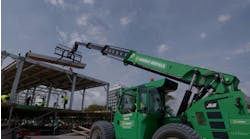Interview with Multiquip’s Juan Quiros: Non-stop Challenges
Juan Quiros, vice president of marketing, Multiquip Inc., talks about sound attenuation, challenges to battery-powered pumps, the growth of specialty rentals, continuing supply-chain issues, and innovations in compact pumps.
RER: What are the latest products and developments in your company’s pump production?
Quiros: In the compact pump arena, the 3-inch trash pump is the segment leader due to its versatility and performance. Over the years, there has been relatively minimal innovation in the way of product design. Multiquip recognized this and introduced pumps with sound attenuation and features that are ideal for work being done in noise-sensitive or remote jobsite environments. We have two models, QP3THX and QP3TS, offering substantially reduced noise levels and longer run times compared to pumps powered by standard air-cooled engines. We also have a unique model, the QP3Ti, that has integrated float switches that have automatic start capabilities and can be used for both pump-up and pump-down applications.
RER: Are there any particular trends you expect to see in pump production in the coming years?
Quiros: The emphasis on battery-powered products affects every equipment category including dewatering pumps. California leads the push, but there remain significant hurdles to overcome in the area of battery design. Manufacturers have their engineers working to develop battery drives, but there is a pressing need to develop a standardized platform that can be used across various equipment lines. For example, run times for battery-powered equipment are still not comparable to conventional engines. How will manufacturers address continuous run applications and charging in remote areas or if there is a power outage? Additionally, the price difference compared to conventional engine driven equipment may initially limit their ability to add battery-powered product to rental fleets.
RER: It seems that pump rentals -- as illustrated by the growing “specialty rental” segments of major rental companies – have grown a lot in recent years. Do you have any insight into why this growth has occurred?
Quiros: General rental companies will always have the flexibility to handle a wide range of applications. However, customers in certain fields appreciate the application knowledge and experience that specialty rental houses can offer – it’s what separates them from the rest. When you can talk to one person who confidently understands both the pump and generator sides of the applications, it provides peace of mind to the rental customer. People want to know they’re dealing with experts in their field.
RER: In many types of construction machinery, especially earthmoving and aerial machines, lead times have increased significantly, as along as 18 months to two years in some cases, often caused by supply chain issues and the difficulty in obtaining certain components and materials. Are you finding the same issues in pump manufacturing?
Quiros: Ongoing supply chain issues affect component availability and lead times for manufacturers in industries. Multiquip, with its diverse product range, isn’t immune from these challenges. In some cases, we have all the components needed to manufacture the product and our production is impacted by insufficient availability of engines. In other cases, we could have ample engine supply and face component shortages elsewhere. This results in non-stop challenges to our purchasing and manufacturing teams, but thanks to their professionalism we’re often able to find creative solutions to minimize the impact to our customers.
RER: Do you have any particular tips for pump rental companies to serve their customers better?
Quiros: Larger pumps garner the attention – 6-inches plus – but keep an eye out for innovations in the compact pump segment as well.






